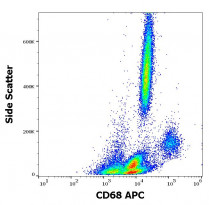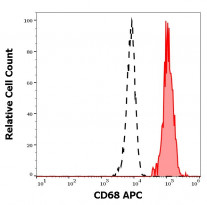ARG42327
anti-CD68 antibody [Y1/82A] (APC)
anti-CD68 antibody [Y1/82A] (APC) for Flow cytometry and Human
Overview
| Product Description | APC-conjugated Mouse Monoclonal antibody [Y1/82A] recognizes CD68 |
|---|---|
| Tested Reactivity | Hu |
| Tested Application | FACS |
| Specificity | The mouse monoclonal antibody Y1/82A recognizes CD68 (LAMP4), a 110 kDa glycoprotein expressed mainly in cytoplasmic granules of monocytes/macrophages, granulocytes, and dendritic cells. |
| Host | Mouse |
| Clonality | Monoclonal |
| Clone | Y1/82A |
| Isotype | IgG2a |
| Target Name | CD68 |
| Antigen Species | Human |
| Immunogen | Lysosomal contents of lung macrophages. |
| Conjugation | APC |
| Alternate Names | Macrosialin; CD antigen CD68; LAMP4; Gp110; GP110; SCARD1 |
Application Instructions
| Application Suggestion |
|
||||
|---|---|---|---|---|---|
| Application Note | * The dilutions indicate recommended starting dilutions and the optimal dilutions or concentrations should be determined by the scientist. |
Properties
| Form | Liquid |
|---|---|
| Purification | Purified |
| Buffer | PBS and 15 mM Sodium azide. |
| Preservative | 15 mM Sodium azide |
| Storage Instruction | Aliquot and store in the dark at 2-8°C. Keep protected from prolonged exposure to light. Avoid repeated freeze/thaw cycles. Suggest spin the vial prior to opening. The antibody solution should be gently mixed before use. |
| Note | For laboratory research only, not for drug, diagnostic or other use. |
Bioinformation
| Database Links | |
|---|---|
| Gene Symbol | CD68 |
| Gene Full Name | CD68 molecule |
| Background | This gene encodes a 110-kD transmembrane glycoprotein that is highly expressed by human monocytes and tissue macrophages. It is a member of the lysosomal/endosomal-associated membrane glycoprotein (LAMP) family. The protein primarily localizes to lysosomes and endosomes with a smaller fraction circulating to the cell surface. It is a type I integral membrane protein with a heavily glycosylated extracellular domain and binds to tissue- and organ-specific lectins or selectins. The protein is also a member of the scavenger receptor family. Scavenger receptors typically function to clear cellular debris, promote phagocytosis, and mediate the recruitment and activation of macrophages. Alternative splicing results in multiple transcripts encoding different isoforms. [provided by RefSeq, Jul 2008] |
| Function | Could play a role in phagocytic activities of tissue macrophages, both in intracellular lysosomal metabolism and extracellular cell-cell and cell-pathogen interactions. Binds to tissue- and organ-specific lectins or selectins, allowing homing of macrophage subsets to particular sites. Rapid recirculation of CD68 from endosomes and lysosomes to the plasma membrane may allow macrophages to crawl over selectin-bearing substrates or other cells. [UniProt] |
| Cellular Localization | Isoform Short: Cell membrane; Single-pass type I membrane protein. Isoform Long: Endosome membrane; Single-pass type I membrane protein. Lysosome membrane; Single-pass type I membrane protein. [UniProt] |
| Highlight | Related products: CD68 antibodies; CD68 Duos / Panels; Anti-Mouse IgG secondary antibodies; Related news: Exploring Antiviral Immune Response Anti-SerpinB9 therapy, a new strategy for cancer therapy RIP1 activation and pathogenesis of NASH |
| Calculated MW | 37 kDa |
| PTM | N- and O-glycosylated. [UniProt] |
Images (2) Click the Picture to Zoom In
-
ARG42327 anti-CD68 antibody [Y1/82A] (APC) FACS image
Flow Cytometry: Human peripheral whole blood stained with ARG42327 anti-CD68 antibody [Y1/82A] (APC) at 10 µl / 100 µl of peripheral whole blood.
-
ARG42327 anti-CD68 antibody [Y1/82A] (APC) FACS image
Flow Cytometry: Separation of Human monocytes (red-filled) from Human CD68 negative lymphocytes (black-dashed). Human peripheral whole blood stained with ARG42327 anti-CD68 antibody [Y1/82A] (APC) at 10 µl / 100 µl of peripheral whole blood.







